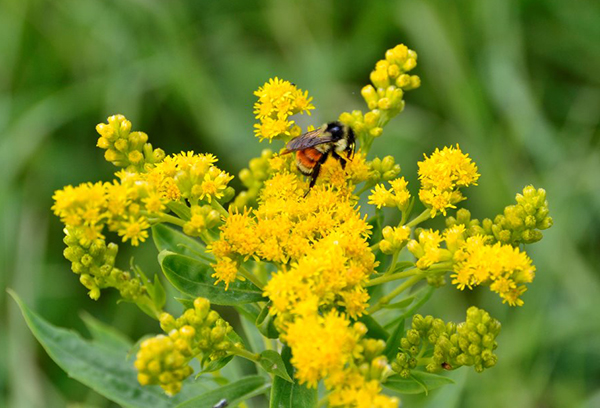Protecting Pollinators Through Community Collaboration
Organization: Edmonton and Area Land Trust (EALT)
Location:
Edmonton
Sherwood Park, St. Albert, Leduc, Devon, Stony Plain, Spruce Grove
Country: Canada
Other Organizations Involved:
- Edmonton Native Plant Group
- Edmonton Nature Club
- Edmonton Community Foundation
- Strathcona County Library
- City of Edmonton
- John Janzen Nature Centre
- Edmonton Valley Zoo
- MacEwan University
- Amiskwaciy Academy
- Sustainable Food Edmonton

Background
Pollinators include bats and birds, but the majority of pollinators in North America are insects: butterflies, moths, flies, beetles, wasps, and bees. These species pollinate about three-quarters of all flowering plants in the world, including many of the plants and crops that we need for food. Because there are fewer pollinators, food-producing plants are pollinated less. We need pollinators like solitary bees to pollinate our plants, including our vegetable plots, flower gardens, and agricultural crops.
Goals
This project has three main goals:
- increase awareness about pollinator importance, declines and conservation through dedicated webpages and brochures, plus raising awareness about these issues and solutions through mainstream, community and social media;
- increase nest sites for bees and other solitary pollinators by building and installing Bee Hotels, and encouraging community groups, businesses and public to do the same; and
- increase pollinator habitat by creating a native flower garden at our first Bee Hotel at our headquarters (at the Edmonton Community Foundation), and distributing native seed packets to encourage the public to plant native plants in their gardens.
Main activities
Activities will include:
- Holding Bee Hotel building workshops in local libraries, community leagues and retail locations, to instruct local residents on how to build their own Bee Hotel for their backyard
- Use volunteers to construct Bee Hotels to place at local businesses, churches and schools in order to promote pollinator conservation, and at EALT.
- Build a large and highly visible Bee Hotel at Larch Sanctuary, a natural area within the City of Edmonton, on which EALT and the City are collaborating on a Conservation Easement granted to EALT for stewardship and education.
- Work with the Edmonton Native Plant Group to install a native flower garden at the site of our first Bee Hotel at our headquarters, the Edmonton Community Foundation, and to promote native flower plantings by giving out native flower seeds to the public.
- Restructure our website to address the topic of pollinator protection and this project, (adding more information and easy-to-search resources), incorporating a gallery of examples, as well as developing brochures, posters and a banner in order to increase regional awareness and resources about how to protect pollinators.
Results
This project will result in an increase in urban habitat for pollinators in Edmonton and the surrounding area. With increased awareness about pollinators will increase, residents will better understand how to help protect pollinators, including how to build Bee Hotels. The number of Bee Hotels available will increase through their direct installation at local businesses, churches, and schools; through individuals making hotels at EALT-led workshops; and through instructions provided to the public on how to design, build and install their own. All of this will lead to a greater public awareness of the importance of pollinators and of conserving their habitat.